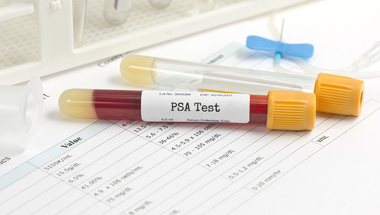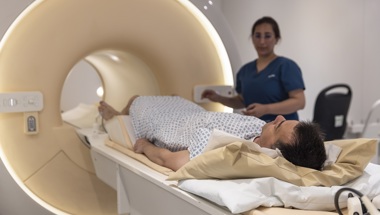Research
05 Jun 2024Behind the headlines: Could this spit test diagnose prostate cancer?
An at-home saliva test has been in the news for its potential to spot men at risk of prostate cancer. It's another step in the right direction towards a national screening programme.

At the world’s biggest cancer conference, ASCO 2024, researchers from The Institute of Cancer Research (ICR) announced that their at-home spit test could spot men most at risk of prostate cancer.
The test, which is not commercially available but was being studied in the BARCODE 1 clinical trial, looks at men’s DNA for small genetic changes that increase their risk of prostate cancer.
That makes it different to the PSA blood test, which measures the level of a molecule made by the prostate itself. A high PSA level can indicate a prostate problem, though not necessarily prostate cancer.

What did the BARCODE 1 study look at?
The study collected spit samples from more than 6,000 white men aged 55 to 69.
These men’s genetics were analysed from their spit, with researchers looking at 130 genetic variations that have been linked to prostate cancer.
From these results, the researchers were able to give each man a personalised risk score.
The 10 per cent of men with the highest risk scores were invited for an MRI scan and a prostate biopsy. Of these men, 40 per cent were diagnosed with prostate cancer.
Is there other research looking at prostate cancer genetics?
Another study at the ICR, called PROFILE, is funded by us and looking at genetic risk factors in Black men and men with a family history of prostate cancer.
BARCODE 1, PROFILE and other studies like them should help us better understand which men are most at risk of the disease so they can be monitored most closely and, hopefully, diagnosed earlier.
Their findings will also feed into our research into a screening programme for prostate cancer.
We might be able to identify men at highest risk of getting prostate cancer based on their genetic make-up, and that this could help determine how frequently they should be screened.
Why are they developing another test for prostate cancer?
Currently, prostate cancer is the most common cancer without a screening programme.
This means too many men in the UK are being diagnosed with advanced, incurable prostate cancer.
An effective, cost-efficient way to screen men would make a huge impact, giving thousands of men a year the chance of an earlier diagnosis and a longer, healthier life.
By picking up which men are at greatest risk of prostate cancer, the ICR test could help doctors find more cases of the disease earlier, when it is easiest to cure.
Simon Grieveson, Assistant Director of Research at Prostate Cancer UK, said: “We welcome these initial results of the BARCODE 1 study.
“What we’ve seen so far provides further evidence that we might be able to identify men at highest risk of getting prostate cancer based on their genetic make-up, and that this could help determine how frequently they should be screened.
“In the meantime, the best test for prostate cancer is still the PSA blood test, which men can get for free from their GP.”

A further step towards prostate cancer screening
While this genetic test is a step in the right direction, our landmark £42m TRANSFORM trial is designed to provide the final pieces of the jigsaw that will lead to a screening programme for prostate cancer. TRANSFORM researchers will study genetic testing alongside other techniques like MRI scans to find the best way to screen men for prostate cancer.
Simon Grieveson added: “Professor Ros Eeles led the BARCODE 1 study and is one of the co-leads of our TRANSFORM trial, so these results will feed directly into that project.
“Crucially, within the TRANSFORM study, this approach will be extended to make sure it works for men of all ethnicities – including Black men, who are twice as likely to be diagnosed with prostate cancer.
“TRANSFORM will provide definitive evidence about the best way to screen for prostate cancer, including if genetic testing – like in BARCODE 1 – can be combined with other techniques like ‘fast’ MRI scans to maximise the number of men we save through screening.
“These results confirm that now is the time for these next steps, which is why we are proud to have instigated and funded the TRANSFORM study.”







